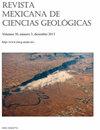Cretaceous cultch: substrate availability for oyster Exogyra in the Maastrichtian of the eastern Mississippi Embayment
IF 0.5
4区 地球科学
Q4 GEOSCIENCES, MULTIDISCIPLINARY
Revista Mexicana De Ciencias Geologicas
Pub Date : 2020-11-24
DOI:10.22201/cgeo.20072902e.2020.3.1580
引用次数: 0
Abstract
The gryphaeid oyster Exogyra Say, 1820, is ubiquitous in Upper Cretaceous sediments in the southeastern United States. Like many oysters (Order Ostreida), Exogyra attached its shell to hard surfaces on the seafloor by means of cementation. Throughout its lifetime, Exogyra may preserve through bioimmuration the characteristics and even skeletal remains of substrate organisms, including mollusk shells, echinoids, and bryozoans. Exogyra costata of all sizes were collected from three different localities within upper Maastrichtian deposits in northeast Mississippi and their bioimmurations analyzed. Substrates were identified and classified to compare the three localities’ substrate taxa in order to probe differences in benthic population structure. The results of this pilot study provide an overview of available surfaces on the Late Cretaceous seafloor on the eastern side of the Mississippi Embayment. The data suggest that taxonomic diversity among utilized substrates may increase from north to south, which corresponds to increasing depth from shallow marine to deeper sediments on the shelf.白垩纪孵育:东密西西比海湾马斯特里赫特地区牡蛎外生生物的基质可用性
1820年,在美国东南部的上白垩纪沉积物中普遍发现了一种石纹牡蛎Exogyra Say。像许多牡蛎(牡蛎目)一样,外生蚝通过胶结把它的壳附着在海底的坚硬表面上。在其一生中,外生动物可以通过生物免疫保存底物生物的特征甚至骨骼遗骸,包括软体动物外壳,棘虫和苔藓虫。在美国密西西比州东北部的上马斯特里赫特(upper Maastrichtian)沉积物的三个不同地点收集了各种大小的外生巨藻,并对它们的生物免疫进行了分析。对底栖生物进行鉴定和分类,比较3个地区底栖生物类群的差异,探讨底栖生物种群结构的差异。这项初步研究的结果提供了密西西比海湾东侧晚白垩世海底可用表面的概述。研究结果表明,利用底物的分类多样性从北向南呈增加趋势,对应于陆架从浅海到深层沉积物的深度增加。
本文章由计算机程序翻译,如有差异,请以英文原文为准。
求助全文
约1分钟内获得全文
求助全文
来源期刊

Revista Mexicana De Ciencias Geologicas
地学-地球科学综合
CiteScore
1.00
自引率
12.50%
发文量
0
审稿时长
6-12 weeks
期刊介绍:
Revista Mexicana de Ciencias Geológicas (RMCG) publishes original research papers on geological processes of broad interest, and particularly those dealing with regions of Latin America. The RMCG also publishes review papers on topics of current interest, and on the geology and tectonics of geological provinces of Latin America. Besides, it offers the opportunity for host editors to publish special thematic issues.
 求助内容:
求助内容: 应助结果提醒方式:
应助结果提醒方式:


